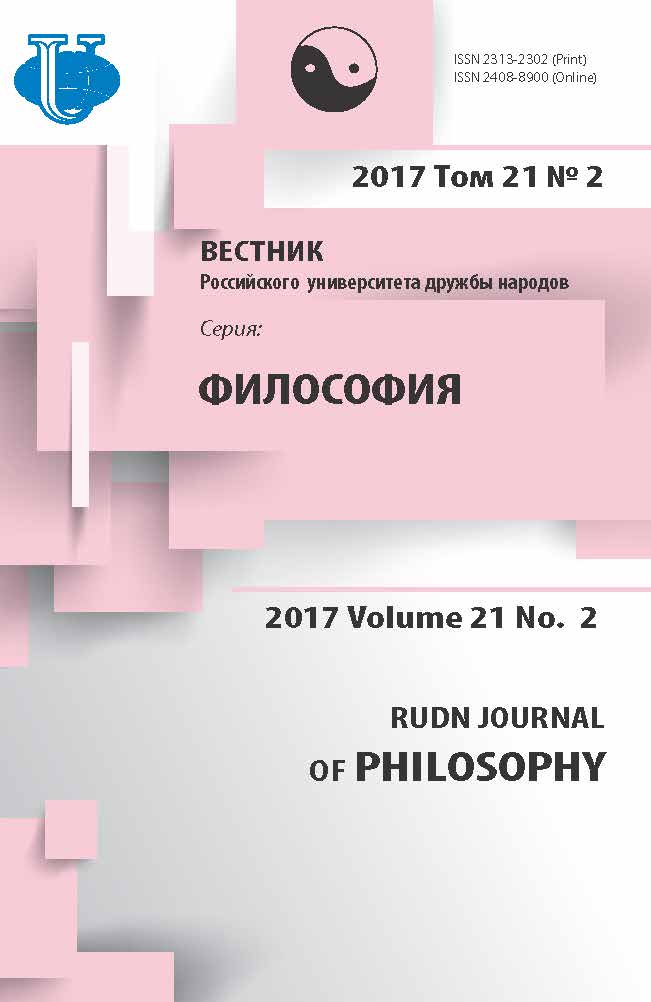Aristotle on the relation between logic and ontology
- Authors: Vasyukov VL1
-
Affiliations:
- Institute of Philosophy of the Russian Academy of Sciences
- Issue: Vol 21, No 2 (2017)
- Pages: 192-198
- Section: Articles
- URL: https://journals.rudn.ru/philosophy/article/view/16178
- DOI: https://doi.org/10.22363/2313-2302-2017-21-2-192-198
- ID: 16178
Cite item
Full Text
Abstract
Aristotle was the founder not only logics but also of ontology which he describes in Metaphysics and Categories as a theory of general properties of all entities and categorical aspects they should be analyzed. Meanwhile it is commonly accepted that we inherited from him not one but two different logics: early dialectical logoi of Topics and later formal syllogistic of Prior Analytics. The last considers logics the same way as the modern symbolic logic do. According to J. Bocheński the symbolic logic is “a theory of general objects” (by apt turn in phrase, a "physics of the object in general”) hence logics, as it is interpreted now, has the same subject as ontology. But does Aristotle himself counts that ontology (as it is accepted to speak now) is just a kind of “prolegomenon” to logic? In the paper some aspects of this issue are studied at length.
About the authors
V L Vasyukov
Institute of Philosophy of the Russian Academy of Sciences
Email: vasyukov4@gmail.com
12/1, Goncharnaja St., 109240, Moscow, Russian Federation
References
- Aristotle. The Organon: Posterior Analytics. Topica. Vol. 2. London: William Heinemann ltd.; Cambridge, Massachusetts: Harvard University Press; 1960. 755 p.
- Aristotle. Prior Analytics. The Complete Works of Aristotle. The revised Oxford translation / J. Barnes (ed.), Vol. 1. Princeton, N.J.: Princeton University Press; 1991.
- Hintikka J. Analyses of Aristotle. New York, Boston, Dordrecht, London, Moscow: Kluwer Academic Publishers; 2004. 238 p.
- Bochenski JM. Logic and Ontology. Philosophy East and West. 24 (3) (Jul., 1974). P. 275-292.
- Wolff Ch. Preliminary discourse on philosophy in general (1728). Indianapolis & New York: The Bobbs-Merrill Company Inc., 1963.
- Owens J. Is There any Ontology in Aristotle? Dialogue. Canadian Philosophical Review. 1986; 25. P. 697-707.
- Leszi W. Aristotle’s Conception of Ontology. Padua, 1975.
- Lukasiewicz J. Aristotle’s Syllogistic from the Standpoint of Modern Formal Logic. 2nd ed. Oxford: Clarendon Press, 1957.
- Corcoran J. The Founding of Logic: Modern Interpretations of Aristotle’s Logic. Ancient Philosophy. 1994; 14. pp. 9-24.
- Russell B. Introduction to Mathematical Philosophy (1919). New York: Dover Publications, 1991. 208 p.
- van Heijenoort J. Logic as Calculus and Logic as Language. Synthese. 1967; 17. P. 324-330.
- Shapiro S. Categories, Structures, and the Frege-Hilbert Controversy: the Status of Meta-Mathematics. Philosophia Mathematica. 2005; 13(1). P. 61-77.
- Hintikka J. Hilbert Vindicated? Synthese. 1997; 110. P. 15-36.
- Peckhaus V. Calculus Ratiocinator vs. Characteristica Universalis? The Two Traditions in Logic, Revisited. History and Philosophy of Logic. 2004; 25(1). P. 3-14.
- Corcoran J. The Founding of Logic: Modern Interpretations of Aristotle’s Logic. Ancient Philosophy. 1994; 14. P. 9-24.
- Corcoran J. et al. The Contemporary Relevance of Ancient Logical Theory. The Philosophical Quaterly. 1982; 32(126). P. 76-86.
- Frege G. Review of E.G. Husserl, Philosophy of Arithmetic I.B. McGuinness (Ed.), Gottlob Frege: Collected Papers on Mathematics, Logic, and Philosophy. Oxford: Basil Blackwell; 1994.
- Popper KR. The Objective Knowledge: An Evolutionary Approach. Oxford: Clarendon Press; 1972.
- Burnyeat M. A Map of Metaphysics Zeta. Pittsburgh: Mathesis Publications; 2001.
- Weigelt Ch. The relation between logic and ontology in the Metaphysics. The Review of Metaphysics. 2007; 60 (issue 3 ). P. 507-542.
Supplementary files















